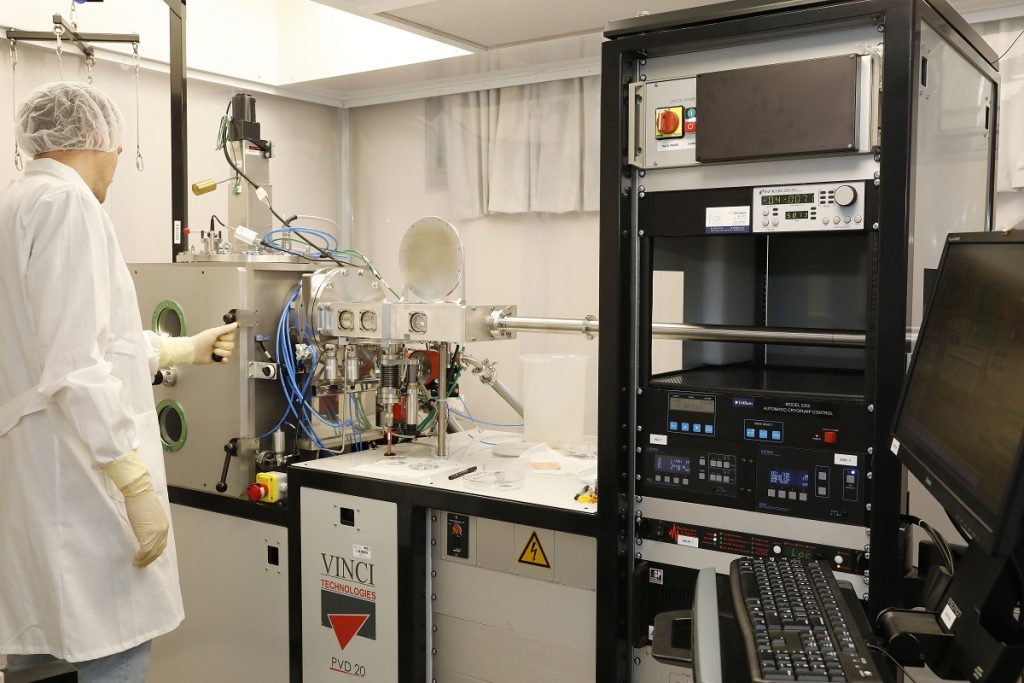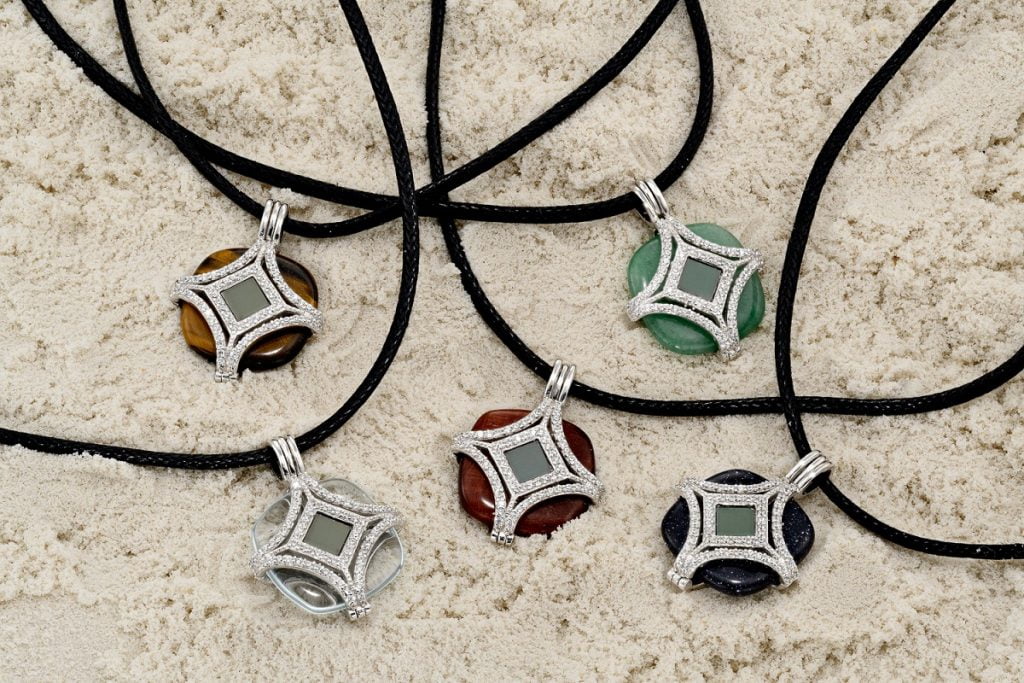Israeli farmers have produced what may be the world’s smallest tomato. An Israeli startup created the world’s smallest and thinnest mobile charger. And in 2009, Israeli scientists at the Russell Berrie Nanotechnology Institute at the Technion in Haifa engraved 1.2 million letters on to a 0.5 mm2 chip no larger than the tip of a pen to develop the world’s smallest Hebrew Bible. This nano bible was displayed in 2015 as part of an exhibit to commemorate the 50th anniversary of the Shrine of the Book wing of the Israel Museum in Jerusalem.
Now scientists at the Tel Aviv University Center for Nanoscience and Nanotechnology have etched out their own micro-sized version of the holy book — one that is embedded into a jewel and can be worn around the neck — thanks to a partnership with a local mother-daughter design team, who have made the smallest bible in the world a meaningful, decorative element of their luxury jewelry collection.

Two and a half years ago, Aviva and Magali Moldawsky, the second and third generation, respectively, of an established family of diamond dealers and jewelers in the business since 1946, had the idea to create “spiritual jewelry,” a line of luxury baubles that create a special connection.
SEE ALSO: Inscribed Glass Shofar, Dead Sea Crystal Among Israeli Artworks Gifted To World Leaders
Magali Moldawsky, in particular, wanted the jewelry to signify “a new era in the existing perception of jewelry,” she tells NoCamels, and give the person wearing it a “special emotional experience” and a “feeling of protection.”

This was the foundation for the duo’s jewelry brand Tanaor, based around all 1.2 million letters and 929 chapters of bible scripture, minimized and inserted into a chip and integrated into an array of decorative pieces.
Moldawsky says she “unintentionally” became acquainted with nanotechnology, the science and technology that can control matter on the atomic and molecular scale, as she finished her Bachelor’s degree in law and economics at Tel Aviv University. Moldawsky asked her mom Aviva, a veteran of the diamond and jewelry world, to help her find a way to combine science, technology, and innovation, with traditional artisan craft.

The pair reached out to the scientists at the Tel Aviv University Center for Nanoscience and Nanotechnology, who were immediately responsive to the idea, and the group decided that they would use the new technology to embed the Hebrew Bible into a tiny nanochip that would eventually become the center of the Tanaor jewelry line.
“This collaboration is quite unique,” Yuval Kupitz, head of international collaboration at the TAU Center, tells NoCamels. “Nanotechnology is usually used for things like smart sensors, drug deliveries, medical devices, electronics, optics. We partnered with a company that produces consumer products. But it’s a great opportunity to enter a traditional industry, which is increasing its value through innovation.”
Moldawsky says the concept of Tanaor exposes and connects worlds, using advanced technological developments to incorporate the history of the Bible in everyday life.
“It is important that the technology is precise and exactly what the customer expects,” Kupitz adds, because of the significance of carrying – or wearing – a Bible. He uses the example of a Jewish client who might be wary of putting on a yarmulke (or kipa skullcap worn by those who practice Judaism) in public but feels great wearing a necklace with a chip featuring the entire Hebrew Bible meticulously placed on a tiny chip.

Each piece of Tanaor jewelry comes with a certificate of authenticity by Rabbi Elihu Shannon, a certified Jewish scribe and recognized expert in the field that has been authorized to transcribe books of the Torah, tefillin, mezuzot, and other religious writings and is employed by the Saad Group, a religious kibbutz in the northern Negev.
Each piece is also checked to confirm the chips contain the entire Bible.
Tanaor sells the nano bible in an assortment of jewelry pieces for men and women, broken up into nine separate collections. Collections feature pendants added to symbols, like the Tree of Life or the Star of David, among other examples, added to word necklaces, leather bracelets, or word necklaces, or added to charms shaped like flowers, keys, or angel wings.

The jewelry ranges from $79.95 for a faith pendant to almost $4,000 for an item from the Gold & Diamonds Luxury Collection exclusively and specially designed by M. Moldawsky Diamonds and Jewelry. Moldawsky says technology-wise, there is no difference between jewelry priced $150 and jewelry priced $1,000.
“Each piece of jewelry has the same nanochip engraved with the entire Bible,” Moldawsky says, “The only difference is the material of the jewelry.” The more affordable collection is made of 925 Sterling Silver with 18K gold/rhodium plating. The Luxury Collection is made from 18K gold and diamonds.
Tanaor jewelry is currently being sold in museums such as the Bible Museum in Washington D.C., the Israel Museum – Jerusalem, and the City of David Museum in Jerusalem. It can also be found on the jewelry company’s official website and on Fly&Buy DutyFree onboard flights for El Al Airlines.
The entire Bible on a nanochip
Sign up for our free weekly newsletter
SubscribeNanotechnology enables someone to take an almost infinite amount of information and minimize it to extremely small dimensions. This is what scientists at the TAU Center for Nanoscience and Nanotechnology did when they embedded all 929 chapters of the Hebrew Bible onto a single chip. More specifically, scientists used an ion beam to dislodge atoms from the plating in order to fashion each of the 1.2 million letters of the Bible on to a silicon chip.

Tanaor calls it a “contemporary interpretation of ancient engraving methods used to inscribe the earliest holy texts.”
Seven distinct steps are required to create the Bible chip, TAU scientists say, including ultra-violet exposure and metallization. Single copies are then cut from a sheet of silicon material into individual chips using a diamond cutting saw. Finally, each chip is incorporated into a piece of jewelry.
Kupitz also notes that TAU scientists perform quality assurance tests and sophisticated scanning methods to ensure the authenticity of the final product.

The nanochip is so small and the letters so minute, that one can only view the holy scripture by using a professional confocal microscope with 100x magnification. These microscopes are mainly available at laboratories in universities and museums.
The first nano center in Israel
The Tel Aviv University Center for Nanoscience and Nanotechnology is the first institute of its kind in Israel. Established in 2000, it provides nanotechnology services to the commercial market in various fields and gives over 50 academic groups and 40 companies access to advanced R&D services, equipment, and research.
The center’s laboratories are used by the nanotechnology community, whether large corporations or small startups.
A larger and more ambitious center is scheduled to open in 2020.
Nanotechnology changing the world
This jewelry project “raises awareness of the amazing advancements of the [TAU] nano center,” says Kupitz. Most of the public is not aware of nanotechnology in general, he adds, and if they are, it’s connected to industries like computers, energy, electronics – not fashion.
Moldawsky believes this collaboration between Tanaor and the TAU Center proves how versatile and useful nanotechnology is in our lives.
Revolutionary nano-techniques are changing the world – constructing new materials, detecting diseases, and even treating water effectively. Tanaor says it aims to bring deeper meaning by creating a seamless synthesis between the world’s earliest writings and the latest advances in nanotechnology.
Originally, the TAU Center for Nanoscience and Nanotechnology was brought on to this project as a service provider — the jewelry company merely wanted to donate its proceeds to the center’s research, not involve them in the jewelry process.
Today, however, the company says it donates 10 percent to a “worthy cause,” but specifically notes its current not-for-profit beneficiary is allocated to supporting the development of nanotechnology science in Israel, especially in the life sciences aspect.
Related posts

Rehabilitation Nation: Israeli Innovation On Road To Healing

Israeli High-Tech Sector 'Still Good' Despite Year Of War





Facebook comments